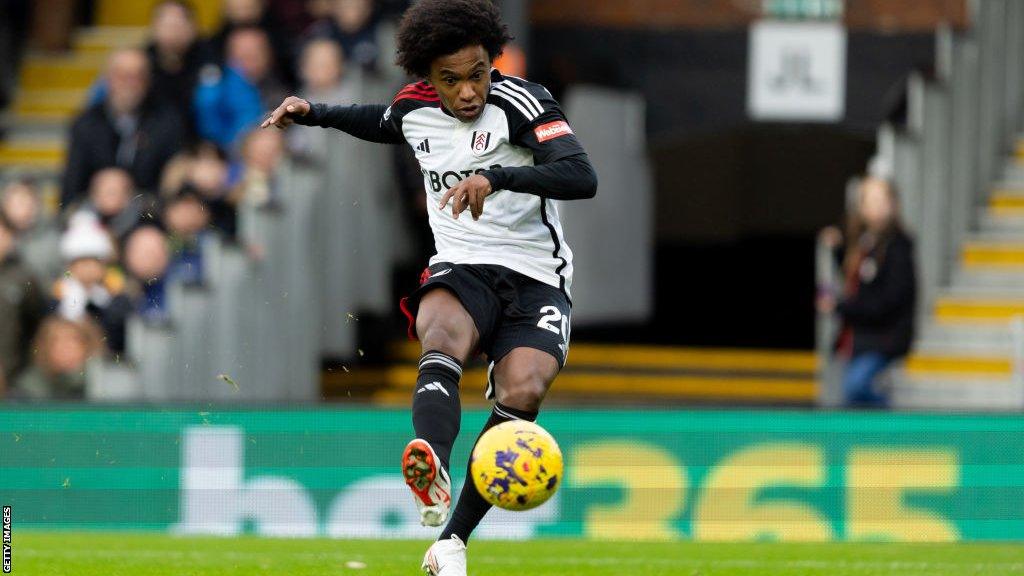Gambling: Premier League and other sporting bodies urged to cut betting adverts
- Published

A betting advert at Fulham's Craven Cottage
The Premier League and other sports governing bodies "should commit to cutting the volume" of gambling adverts in stadiums, says an influential group of MPs.
In a new report, the Culture, Media and Sport (CMS) Committee said a reduction was needed "to shield children from exposure" to betting companies' logos.
The parliamentary group's chair, Dame Caroline Dinenage, said that "more should be done…[over] what often seems like a bombardment of advertising branding at football and other sporting events".
During the 2022-23 season, eight Premier League clubs had gambling companies on the front of their shirts, in deals worth an estimated £60m per year.
In April 2023, Premier League clubs reached a groundbreaking agreement to withdraw gambling sponsorships on the front of match shirts by the end of the 2025-26 season.
While welcoming the move, the cross-party committee warns that this will "not significantly reduce the volume of betting adverts visible during a game" with clubs still able to continue featuring them on shirt sleeves and with LED perimeter advertising.
Its report cites a recent study that found that front-of-shirt gambling branding accounted for just 7% of all gambling advertising that was visible during 10 broadcast matches. It also revealed that nearly 7,000 gambling messages could be seen during six matches on the opening weekend of the season.
The MPs recommend that a new gambling sponsorship code of conduct for sports should include provision to reduce adverts in stadia, and ensure more space is dedicated to safer gambling messaging. "The publication of the code has been delayed repeatedly which is highly regrettable" they add. "The government should require the relevant sporting bodies to publish [it]…without further undue delay."
They also call on ministers to take "a more precautionary approach" than that proposed in the gambling white paper, published earlier this year, which avoided firm restrictions on advertising. "While a complete ban on gambling advertising would not be appropriate, there is still scope for further regulation…" they say. The committee adds that there should be "a distinct approach…for horse racing and greyhound racing, given their close and long-standing relationships with betting".
Dinenage said that "…more should be done to shield both children and people who have experienced problem gambling from what often seems like a bombardment of advertising branding at football and other sporting events".
A Premier League spokesperson said its clubs "collectively agreed to withdraw gambling sponsorship from the front of matchday shirts following extensive consultation with the league and the government. The Premier League is now currently working with other sports and the government on the development of a new code for responsible gambling sponsorship.
"While the Premier League does not have a central gambling-related partner, our clubs adhere to all the legal and regulatory requirements that flow from the law…"
A Department for Culture, Media and Sport spokesperson said: "The gambling white paper outlines a balanced and proportionate package of measures, delivering greater protections for those at risk of experiencing harm, while having minimal impact on the freedoms of the large majority of punters…"
"There are already robust rules in place to ensure gambling advertising is socially responsible, and we support the work ongoing across the sport sector to develop new standards through an industry wide code of practice."
Last year footballers were among celebrities banned from appearing in gambling adverts that targeted youngsters under new rules.
However, a spokesperson for the Big Step campaign group said: "Gambling advertising in our national sport is out of control, with thousands of ads for addictive products infecting the minds of children every single match. Behind every advert is the reality that gambling causes devastating harm to millions of families in the UK.
"Although it's welcome that these MPs are calling for action, sadly their recommendations do not touch the sides. If they're deemed harmful enough to be reduced, then all ads should be removed from every football ground. This government or the next must end all gambling advertising and sponsorship in football."
The MPs say the "whistle-to-whistle" ban on TV betting adverts during live sport, introduced by the gambling industry in 2019, had been "criticised as ineffective because match viewers - whether inside the stadium or watching on TV - are still exposed to numerous adverts and logos displayed on perimeter boards and kit".

Our coverage of your Premier League club is bigger and better than ever before - follow your team and sign up for notifications in the BBC Sport app to make sure you never miss a moment
